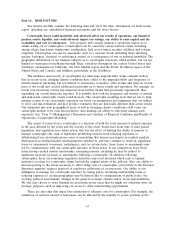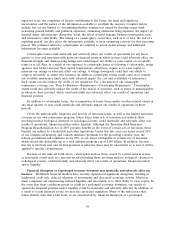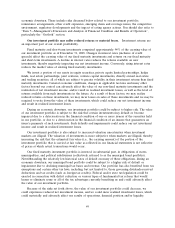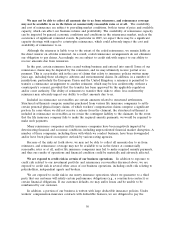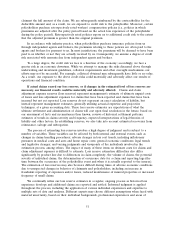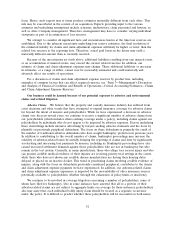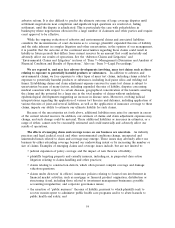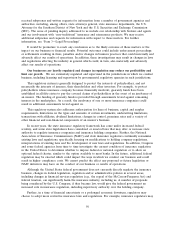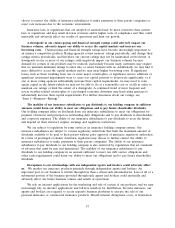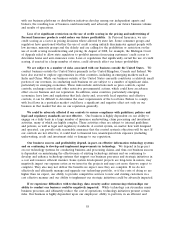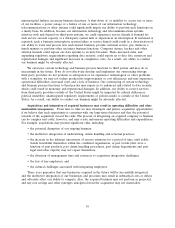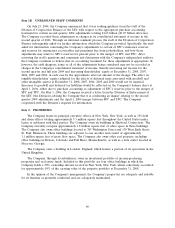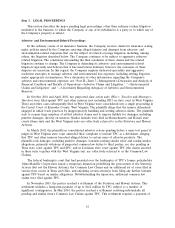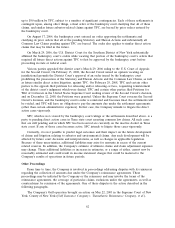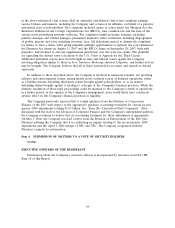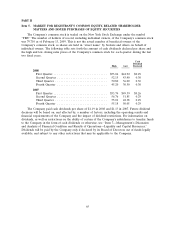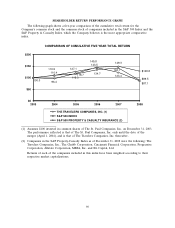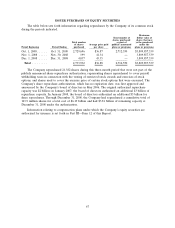Travelers 2008 Annual Report Download - page 69
Download and view the complete annual report
Please find page 69 of the 2008 Travelers annual report below. You can navigate through the pages in the report by either clicking on the pages listed below, or by using the keyword search tool below to find specific information within the annual report.choose to restrict the ability of insurance subsidiaries to make payments to their parent companies or
reject rate increases due to the economic environment.
Insurance laws or regulations that are adopted or amended may be more restrictive than current
laws or regulations and may result in lower revenues and/or higher costs of compliance and thus could
materially and adversely affect our results of operations and limit our growth.
A downgrade in our claims-paying and financial strength ratings could adversely impact our
business volumes, adversely impact our ability to access the capital markets and increase our
borrowing costs. Claims-paying and financial strength ratings have become increasingly important to
an insurer’s competitive position. Rating agencies review insurers’ ratings periodically, and change their
ratings criteria periodically, and therefore our current ratings may not be maintained in the future. A
downgrade in one or more of our ratings could negatively impact our business volumes because
demand for certain of our products may be reduced, particularly because many customers may require
that we maintain minimum ratings to enter into or renew business with us. Additionally, we may find it
more difficult to access the capital markets and we may incur higher borrowing costs. If significant
losses, such as those resulting from one or more major catastrophes, or significant reserve additions or
significant investment impairments were to cause our capital position to deteriorate significantly, or if
one or more rating agencies substantially increase their capital requirements, we may need to raise
equity capital in the future (which we may not be able to do at a reasonable cost or at all) in order to
maintain our ratings or limit the extent of a downgrade. A continued trend of more frequent and
severe weather-related catastrophes or a prolonged economic downturn may lead rating agencies to
substantially increase their capital requirements. For further discussion about our ratings, see,
‘‘Item 1—Business—Ratings.’’
The inability of our insurance subsidiaries to pay dividends to our holding company in sufficient
amounts would harm our ability to meet our obligations and to pay future shareholder dividends.
Our holding company relies on dividends from our insurance subsidiaries to meet our obligations for
payment of interest and principal on outstanding debt obligations and to pay dividends to shareholders
and corporate expenses. The ability of our insurance subsidiaries to pay dividends to us in the future
will depend on their statutory surplus, earnings and regulatory restrictions.
We are subject to regulation by some states as an insurance holding company system. Our
insurance subsidiaries are subject to various regulatory restrictions that limit the maximum amount of
dividends available to be paid to their parent without prior approval of insurance regulatory authorities.
In a time of prolonged economic downturn, regulators may choose to further restrict the ability of
insurance subsidiaries to make payments to their parent companies. The ability of our insurance
subsidiaries to pay dividends to our holding company is also restricted by regulations that set standards
of solvency that must be met and maintained. The inability of our insurance subsidiaries to pay
dividends to our holding company in an amount sufficient to meet our debt service obligations and
other cash requirements could harm our ability to meet our obligations and to pay future shareholder
dividends.
Disruptions to our relationships with our independent agents and brokers could adversely affect
us. We market our insurance products primarily through independent agents and brokers. An
important part of our business is written through less than a dozen such intermediaries. Loss of all or a
substantial portion of the business provided through such agents and brokers could materially and
adversely affect our future business volume and results of operations.
We rely on internet applications for the marketing and sale of certain of our products, and we may
increasingly rely on internet applications and toll-free numbers for distribution. In some instances, our
agents and brokers are required to access separate business platforms to execute the sale of our
personal insurance or commercial insurance products. Should internet disruptions occur, or frustration
57


